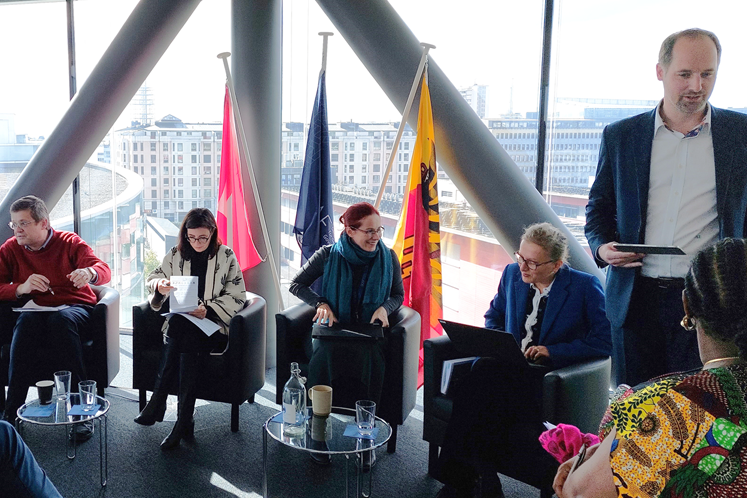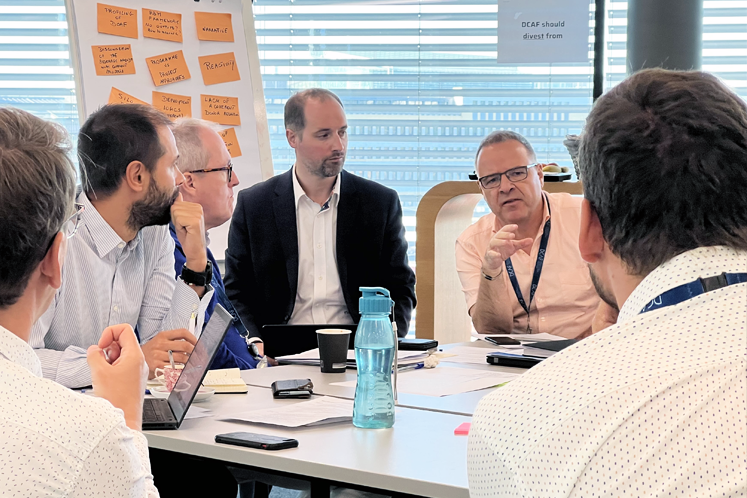What have we learned in the last 5 years?
The last five years have been an exceptionally challenging time around the world. From COVID to a growing number of climate change-related disasters, to outbreaks of conflict in Europe, the Middle East, and Western Africa, and democratic backsliding that threatens the very concept of citizen oversight and accountability.
Even with fully engaged partners and willing international donors, it has been more difficult than ever to help make a difference, especially in the more fragile and conflict-affected contexts in which we work.
All this was very much on our minds as we sat down to review our progress over 2020-2024 and plan our approach and strategic objectives for 2025 - 2030.
We began with an intensive internal food-for-thought reflection with staff, donors, and partners on the successes and challenges of our previous five year strategy period. We also invited feedback and recommendations from external experts and stakeholders who are familiar with DCAF’s work. They provided valuable reality checks and insight into the trends, challenges, and opportunities for SSG/R at the national, regional, and international level.
We came away from these discussions with several important lessons learned that have shaped our approach and the creation of DCAF’s Strategy 2025 – 2030.
We know that our purpose remains as relevant as ever.
As complex security challenges multiply, we have an increasing demand from our partners to support holistic reforms of their security sectors. DCAF’s three levels of support - strategic and operational advice, policy research and influence, and knowledge-sharing and capacity building - allow us to operate at multiple levels. We want to use them more effectively to strengthen an institutionalized feedback loop that delivers a high-level analysis of global trends that is informed by the reality of what’s happening on the ground.

DCAF’s 2025-2030 Strategy was developed through a series of discussions with staff, donors,
partners, and external experts. They brought up trends, challenges, and opportunities for
security sector reform in the contexts in which we operate – and how DCAF can adapt for
the greatest success. Photo: DCAF.
We need to be responsive to the needs of people in fragile contexts.
It can no longer be business as usual in the fragile and conflict-affected contexts in which we work, such as Burkina Faso, Lebanon, Mali, and Yemen. Classic approaches must be adapted to a people-centred approach that reflects new ways of working and accounts for the different security and justice needs of different people and communities.
We must overcome resistance to gender equality.
Our experience shows that integrating a gender perspective and adopting an intersectional lens into SSG increases local ownership, improves the delivery of security and justice, increases gender equality, and enhances the oversight and accountability of the security sector. We need to make a better, stronger case for gender equality across the board in order to overcome institutionalized discrimination based on gender and other intersecting factors.
We have to look beyond working only with state institutions.
In many of the unstable, conflict-affected environments where we work, fragility is defined by structural state deficits that SSG alone cannot fix. It is essential to consider hybrid security dynamics and actors with a deliberate effort to understand their role and influence and identify potential entry-points to engage with them. This will require DCAF to operate at more local levels, beyond capital cities and regional capitals.
We need to amplify our engagement with the private sector.
The continued quest for minerals to underpin the green transition has increased the spotlight on security and human rights risks in private sector operations and supply chains. Private military and security companies have also gained increasing prominence, particularly in fragile states. Over the next strategic period, we plan to further engage with the private sector as part of a holistic, multistakeholder approach to SSG.

Photo: DCAF.
We must engage with our partners even earlier to influence change.
In many contexts where there has been a transition from war to peace, or from authoritarian rule to democratic governance, security sector reform has become central to the political process. For the greatest success it’s important to engage with a wide range of actors even before a formal transition process is fully underway. This allows time to build relationships and capacity and help prepare the ground for the eventuality that a window of opportunity to support reform processes will emerge.
We aim at being more intentional about reinforcing SSG in international frameworks.
Effective SSG is key to all three pillars of multilateralism: development, peace and security, and human rights. However, the ongoing risks to multilateralism – and the concepts underpinning democratic governance itself – underscore the need to reinforce international engagement on SSG. We will foster a collective commitment to prioritize these issues and integrate them into broader policy discussions and initiatives at the international level.
We want to build on DCAF’s ability to adapt to the changing environment.
In this rapidly evolving global context, our strength is our ability to adapt. During the next strategic period, we foresee an even greater need to be agile and develop innovative responses to democratic backsliding and shrinking civic space. To do so, we need to reinforce our existing competencies and develop novel and adaptive approaches.
You can read more in detail on our lessons learned, as well as our goals and objectives for the next six years, by downloading the DCAF Strategy 2025 - 2030 in English or French.
 Share on Facebook
Share on Facebook Share on Linkedin
Share on Linkedin Share on Twitter
Share on Twitter